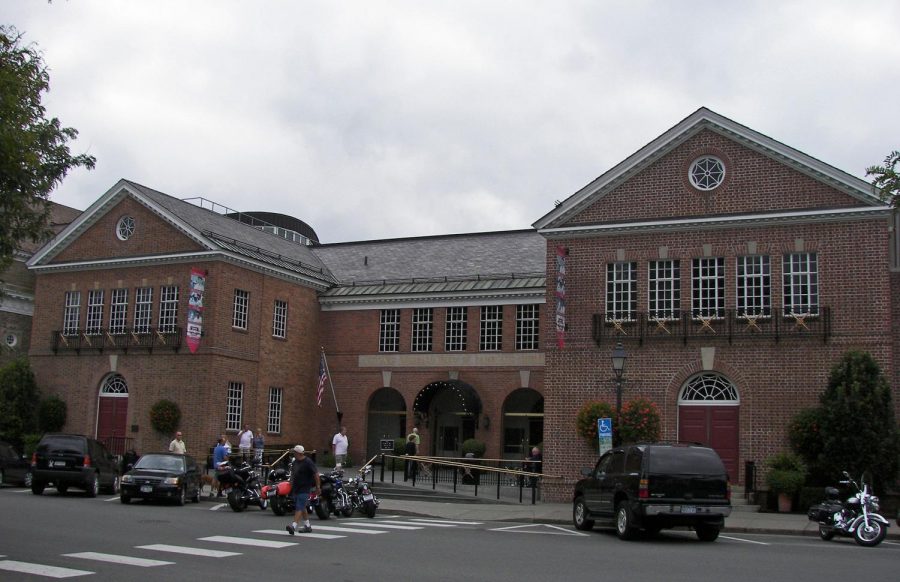ANALYSIS: Legendary Closer Mariano Rivera Headlines the 2019 Baseball Hall of Fame Class
The Baseball Hall of Fame in Cooperstown, New York. Photo credit: Photo via Wikimedia Commons under Creative Commons license.
February 1, 2019
Four new players will be immortalized in the Baseball Hall of Fame in Cooperstown, New York this summer. Mariano Rivera, who became the first player unanimously elected to the hall, Roy Halladay, Edgar Martinez and Mike Mussina were all elected to the Hall of Fame last week by the Baseball Writers’ Association of America (BBWAA). Rounding out the 2019 class are Lee Smith and Harold Baines, both of whom were voted in by the Veteran’s Committee last month.
To be elected, a player must appear on 75 percent of the 425 BBWAA ballots cast. Those on the Veteran’s Committee ballot must earn 75 percent of the votes of the 16-member committee.
Mariano Rivera
Rivera is widely considered the greatest closer in baseball history. The former New York Yankees pitcher became the first player in history to be elected unanimously into the Hall of Fame. Rivera was a 13-time All-Star, five-time World Series Champion, MVP of the 1999 World Series and finished in the top five of the Cy Young voting five times.
His 652 saves are the most in Major League history and his 1.00 WHIP is third all time. He has nearly twice as many postseason saves (42) as Brad Lidge (24) who is second all time, and his 0.70 ERA in the playoffs is the best mark in history. All in all, Rivera was a shoo-in for enshrinement and will don the pinstripes when he is inducted in July.
Roy Halladay
This one comes on a bit of a somber note. Halladay died in a plane crash on November 7, 2017. The late Halladay was one of the best pitchers of his generation, but almost never made it. Halladay appeared on 85.4 percent of the 425 ballots cast. Halladay had a bad year in 2000 and was sent down to Single-A to reshape his mechanics. The move to the minors ultimately shaped his career as he went on to win 203 games, two Cy Young Awards, and struck out 2,117 batters in his 16-year career.
Halladay also threw two no-hitters in his career, one of which was a perfect game against the Florida Marlins in 2010. The other came in Game 1 of the 2010 National League Division Series against the Cincinnati Reds, which was the second no-hitter in postseason history. The eight-time All-Star led his league in shutouts four times, complete games seven times, and innings pitched four times. Halladay will don a blank cap on his plaque at the wishes of his family.
Edgar Martinez
Edgar Martinez made history in a sense as he is the first full-time designated hitter to be elected to the Hall of Fame. Martinez also received 85.4 percent of the vote and gets in on his 10th and final year of eligibility. Martinez was a five-time Silver Slugger Award winner, and two-time batting champion. The seven-time All-Star had a career batting average of .312 and blasted 309 home runs over his 18-year career. Martinez’s election could pave the way for David Ortiz to potentially be elected when he is eligible in 2022. Martinez spent his entire career with the Mariners, so there is no question as to what cap he will wear on his Hall of Fame plaque.
Mike Mussina
Also known as “Moose,” Mussina was the fourth and final player to be elected on the writer’s ballot. This one was a curious choice as he never won a Cy Young Award or a World Series. Nevertheless, he received 76.7 percent of the vote and will be the sixth member of the Class of 2019. The five-time All-Star won 270 games and tallied more than 3,500 innings pitched. Mussina also won seven Gold Golves and won 20 games in his final season in 2008 with the Yankees. Mussina spent 10 seasons with the Baltimore Orioles and eight with the Yankees. Mussina decided to have no team affiliation on his plaque, much to the displeasure of fans.
Some notable players who did not receive the necessary 75 percent included Curt Schilling (60.9), Roger Clemens (59.5), Barry Bonds (59.1), and Fred McGriff (39.8), who failed to get elected in his 10th and final year on the BBWAA ballot.
Looking ahead to next year’s potential candidates, Derek Jeter is the only name that really jumps off the page. Jeter will likely get elected in his first year of eligibility, but it is hard to say if there will be anyone else joining him. Schilling will likely take a step forward along with Omar Vizquel. Bonds and Clemens have the steroid bug keeping them out but next year will be crucial for them if they want to be elected in their final three years on the ballot. With a weak ballot, it is likely that the two will see a large increase in their percentages, since there really isn’t anyone new worthy of a vote. It is reasonable to expect that Bonds and Clemens reach the mid 60s next year, which could position them for a possible election in 2021, since there is nobody of note coming onto the ballot that year.
The Baseball Hall of Fame Class of 2019 will be honored the entire weekend of July 19-21, with the induction ceremony scheduled for July 21. To see the rest of the voting results, visit the Baseball Writers’ Association of America’s website.
Contact the writer: [email protected]
Twitter: @B_Murphy_TWW





